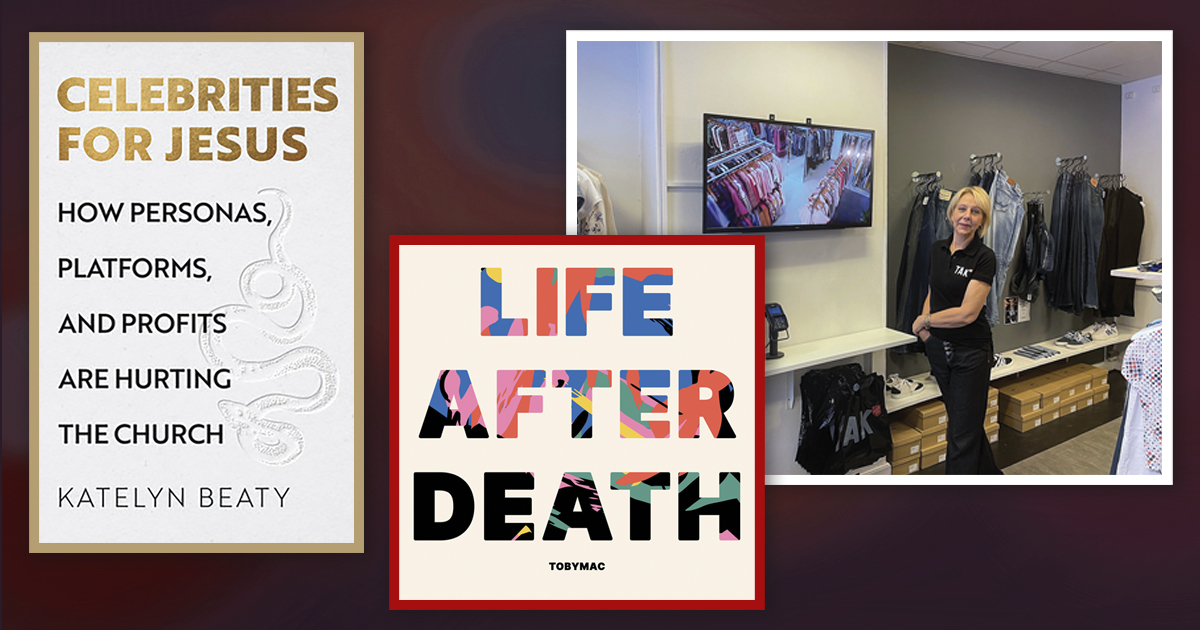NEW & NOTABLE

Celebrities for Jesus: How Personas, Platforms, and Profits Are Hurting the Church
by Katelyn Beaty
REVIEW BY JESSICA MORRIS
In Celebrities for Jesus: How Personas, Platforms, and Profits Are Hurting the Church, journalist Katelyn Beaty uses her intimate
knowledge of evangelical culture, the media and journalistic practice to explore why the modern church idolizes men (predominantly more than women, and of Anglo-Saxon background), and what happens to people and communities when they fall short.
She deep-dives into the history of celebrity Christian culture—uncovering why humans are obsessed with celebrities and how the mega-church and mega-pastor movement started in the late 1970s and early ’80s. From there, she uses real-life examples to characterize the major temptations of the celebrity Christian. Power—such as how Christian comedian John Crist used his fame for sexual favours. Platform—such as the backdoor methods some pastors have used to make The New York Times bestseller list. And persona—such as how rapper Kanye West became a Christian commodity and topped charts with a gospel album despite his actions not always aligning with his professed faith.
Beaty seeks to understand what motivates celebrity Christians when they begin ministry, what changes, and how the fallout of specific actions can harm peoples’ faith and the church. Ultimately, she rests on the fact that faith was made to be lived out in a real face-to-face community, where we can have life-giving and honest relationships with people.
Reprinted from Others, others.org.au
 Life After Death
Life After Death
by TobyMac
In his ninth studio album, seven-time Grammy Award nominee TobyMac opens up about tragedy in his own life, the death of his son in 2019, and the deep trust and connection with God that walked him through it. Life After Death is a contemporary Christian album that features pop, rap and country influences while honouring traditional worship with lyrics such as “All I was is lost, but now I’m found.”
The 15-track album includes collaborations with artists such as worship pastor Jon Reddick, Sheryl Crow, and his own daughter, Marlee McKeehan, who shares their story of grief and loss in Everything About You.
Life After Death, which features TobyMac’s staple upbeat tracks and new song, 21 Years, a tribute to his son, shares the overarching message that God is always with you through the hardest moments, walking you through the darkness to find joy on the other side.
IN THE NEWS
Digital or In-Person Worship? Millennials Embrace Both
A study from a University of Waterloo sociologist found that 32 percent of millennials in North America engage in digital spiritual or religious activities at least once monthly. Of these digital worshippers, only five percent said they participate in religion exclusively online—most choose to worship in person once a month or more.
In an article for Religion News Service, sociologist Sarah Wilkins-Laflamme explains that these findings show that most people are involved in person, but some supplement with digital religious practices such as Bible apps or Instagram posts. According to Pauline Cheong, a professor at Arizona State University, these findings will help ease growing concern of technology displacing religiosity.
The study does not include gen-Z data, and though millennials continue to use virtual resources, in-person religious practices are still vital to engaging and appealing to younger generations. Going forward, Cheong suggests religious organizations and faith leaders focus on building relationships to cultivate this engagement.
From religionnews.com.
 Automation Innovation Keeps Danish Thrift Shops Open
Automation Innovation Keeps Danish Thrift Shops Open
The recycling program run by The Salvation Army’s Denmark and Greenland Territory has come up with an innovative solution to the problem of falling volunteer numbers—an automated store that can open without any staff present.
The system at the automated shop is simple. Gert Pedersen, territorial recycling manager, explains: “There is a sign on the shop door with a phone number on it. You send a text message to that number, the door clicks open and you can enter.”
Once in, customers can browse as usual, with cameras recording for security purposes. “When you’ve decided what to buy, you scan a barcode and pay with your card or smartphone.”
The automated shop can open for longer hours—currently 8 a.m. to 8 p.m.—and volunteers are only needed to help with restocking. Two months into the experiment, things are going better than expected. “Sales have actually gone up,” says Pedersen.
A second automated shop opened in September at a new location.
Report by IHQ Communications.
This story is from:










Leave a Comment